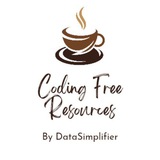Infosys Python - Pandas Interview Q & A.pdf
56.8 KB
👉🏻 DO LIKE IF YOU WANT MORE CONTENT LIKE THIS FOR FREE 🆓
Python Cheat Sheet.pdf
677.7 KB
This cheat sheet includes basic python required for data analysis excluding pandas, numpy & other libraries
Pandas basics to advanced.pdf
854.6 KB
Pandas basics to advanced.pdf
👍5🔥2
Want to build your first AI agent?
Join a live hands-on session by GeeksforGeeks & Salesforce for working professionals
- Build with Agent Builder
- Assign real actions
- Get a free certificate of participation
Registeration link:👇
https://gfgcdn.com/tu/V4t/
Like for more free resources ❤️
Join a live hands-on session by GeeksforGeeks & Salesforce for working professionals
- Build with Agent Builder
- Assign real actions
- Get a free certificate of participation
Registeration link:👇
https://gfgcdn.com/tu/V4t/
Like for more free resources ❤️
👍3
Here are 7 Steps I Use For Mastering Any Interview Question:
Interviews can be nerve-wracking, but with the right practice, you can ace any question that comes your way.
Here’s a tried-and-true method to prepare effectively:
1. Write Bullets on the Topic
📝 Outline key points and what you want to convey. Use the job description as a cheat sheet.
2. Convert Bullets into a Script
📜 Create a 1-2 minute script from your bullets. This helps organize your thoughts.
3. Practice Aloud or Record Yourself
🎤 Speak your script out loud or record yourself to get comfortable with the material.
4. Use Google’s Free Interview Warmup AI
🤖 Practice with Google’s Interview Warmup AI to get real-time feedback.
5. Take Feedback and Tweak Your Script
🔄 Use the AI’s feedback to refine and improve your response.
6. Record Again and Seek Feedback
📽️ Record your refined response and send it to others for additional feedback.
7. Conduct Mock Interviews
🤝 Practice with fellow job searchers or friends. Simulate real interview scenarios to build confidence and get diverse feedback. If you can find someone who has works there, even better.
Repeat these steps for any interview question to build confidence and polish your answers.
Interviews can be nerve-wracking, but with the right practice, you can ace any question that comes your way.
Here’s a tried-and-true method to prepare effectively:
1. Write Bullets on the Topic
📝 Outline key points and what you want to convey. Use the job description as a cheat sheet.
2. Convert Bullets into a Script
📜 Create a 1-2 minute script from your bullets. This helps organize your thoughts.
3. Practice Aloud or Record Yourself
🎤 Speak your script out loud or record yourself to get comfortable with the material.
4. Use Google’s Free Interview Warmup AI
🤖 Practice with Google’s Interview Warmup AI to get real-time feedback.
5. Take Feedback and Tweak Your Script
🔄 Use the AI’s feedback to refine and improve your response.
6. Record Again and Seek Feedback
📽️ Record your refined response and send it to others for additional feedback.
7. Conduct Mock Interviews
🤝 Practice with fellow job searchers or friends. Simulate real interview scenarios to build confidence and get diverse feedback. If you can find someone who has works there, even better.
Repeat these steps for any interview question to build confidence and polish your answers.
👍2
📅 Full Stack Developer Roadmap 2025 🚀
Step-by-step guide to mastering full stack development this year!
🔹 January - February: HTML, CSS, Git, and Basic JavaScript
Master the foundations of web development, responsive design, and version control.
🔹 March - April: JavaScript Deep Dive & DOM Manipulation
Learn ES6+, async programming, closures, and event-driven development.
🔹 May - June: Frontend Frameworks (React, Vue, or Angular)
Understand component-based development, state management, and API integration.
🔹 July - August: Backend Development (Node.js, Express, or Django)
Learn how servers work, REST & GraphQL APIs, authentication, and middleware.
🔹 September - October: Databases & Cloud Deployment
Master SQL (PostgreSQL, MySQL) or NoSQL (MongoDB, Firebase), and deploy apps on AWS, Vercel, or Heroku.
🔹 November - December: Testing, Security & DevOps
Write unit tests, improve security, implement CI/CD, and optimize performance.
💡 Build real-world projects, collaborate, and keep learning!
Drop a ⚡️ if you're in!
Step-by-step guide to mastering full stack development this year!
🔹 January - February: HTML, CSS, Git, and Basic JavaScript
Master the foundations of web development, responsive design, and version control.
🔹 March - April: JavaScript Deep Dive & DOM Manipulation
Learn ES6+, async programming, closures, and event-driven development.
🔹 May - June: Frontend Frameworks (React, Vue, or Angular)
Understand component-based development, state management, and API integration.
🔹 July - August: Backend Development (Node.js, Express, or Django)
Learn how servers work, REST & GraphQL APIs, authentication, and middleware.
🔹 September - October: Databases & Cloud Deployment
Master SQL (PostgreSQL, MySQL) or NoSQL (MongoDB, Firebase), and deploy apps on AWS, Vercel, or Heroku.
🔹 November - December: Testing, Security & DevOps
Write unit tests, improve security, implement CI/CD, and optimize performance.
💡 Build real-world projects, collaborate, and keep learning!
Drop a ⚡️ if you're in!
👍4⚡2
HTML5NotesForProfessionals.pdf
1.3 MB
HTML5NotesForProfessionals.pdf
👍3
